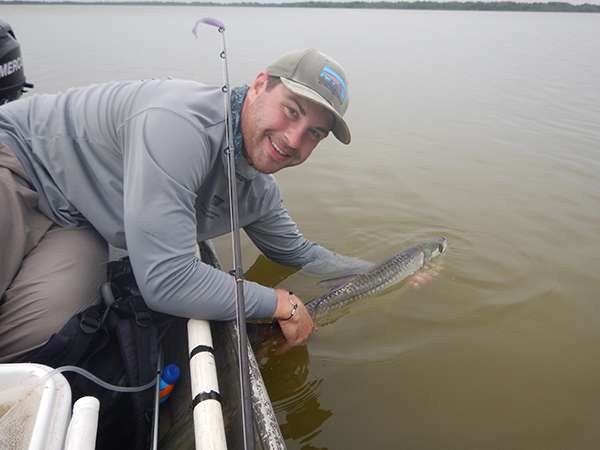Freshwater flow affects Everglades fish, but how?

With tarpon fishing season at its peak, FIU scientists are tracking the saltwater fish throughout the Florida Everglades. They want to know how water conditions affect some of the state's most lucrative recreational fisheries.
Scientists in FIU's Institute of Water and Environment are examining tarpon and snook communities taking up residence in two Everglades lake systems. One system has high levels of phosphorous and saltwater caused by altered freshwater flow and sea level rise. The other resemble conditions before freshwater was diverted to nearby homes and farms. Using radio transmitters and receivers, preliminary findings show the fish are staying upstream where salinity levels are lower. They are using the resources within that system and possibly adapting to conditions.
"The lakes are a great case study for how climate change may affect recreational fish communities in the future," said Cody Eggenberger, an environmental studies graduate student who is leading the project. "With tarpon and snook being two of the most targeted species in Florida, determining best practices for the sustainability of these fisheries is critical."
Since the 1940s, people have developed parts of the Everglades into urban and agricultural areas, and they have built canals, levees and other flood control devices throughout what remains. As efforts to restore freshwater flow are under way, uncertainties on how these changes will affect fish communities remain. The scientists are also studying how disturbances to seagrass communities affect recreational fish in the area. Unlocking the answers to these unknowns is critical since Florida's recreational fishing industry is worth an estimated $7.6 billion and it supports nearly 109,300 jobs, according to the National Marine Fisheries Service.
"Recreational fishing is at the core of who we are as Floridians, yet we have a poor understanding of how our fisheries are affected by water conditions and management," said Jennifer Rehage, researcher and associate professor in the Department of Earth and Environment. "Studies that help us understand what makes for healthy fish populations are key to healthy fisheries, ecosystems and economies in Florida."
More information: The project, funded by the Ocean Tracking Network and the South Florida Water Management District, will conclude in 2019.
Provided by Florida International University
















